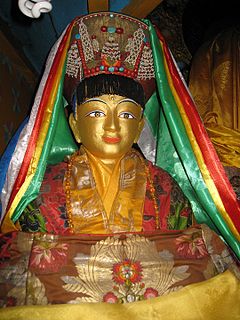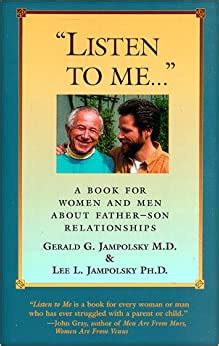A Quote by Geshe Kelsang Gyatso
No matter how many possessions we acquire, they will not provide us with any lasting happiness and freedom. On the contrary, it is often our pursuit of material possessions that causes our problems. If we want ultimate happiness and freedom from suffering, we must engage in the supreme practices of training the mind. There is no other way.
Quote Topics
Acquire
Any
Causes
Contrary
Engage
Freedom
Freedom From
Happiness
How
Lasting
Lasting Happiness
Many
Material
Material Possessions
Matter
Mind
Must
Often
On The Contrary
Other
Our
Possessions
Practices
Problems
Provide
Pursuit
Suffering
Supreme
Training
Training The Mind
Ultimate
Ultimate Happiness
Us
Want
Want U
Way
Will
Related Quotes
Material possessions, in themselves, are good. We would not survive for long without money, clothing and shelter. We must eat in order to stay alive. Yet if we are greedy, if we refuse to share what we have with the hungry and the poor, then we make our possessions into a false god. How many voices in our materialist society tell us that happiness is to be found by acquiring as many possessions and luxuries as we can! But this is to make possessions into a false god. Instead of bringing life, they bring death.
In a very real way, the poor are our teachers. They show us that people’s value is not measured by their possessions or how much money they have in the bank. A poor person, a person lacking material possessions, always maintains his or her dignity. The poor can teach us much about humility and trust in God.
We tend to think of consecration only as yielding up, when divinely directed, our material possessions. But ultimate consecration is the yielding up of oneself to God. Heart, soul, and mind were the encompassing words of Christ in describing the first commandment, which is constantly, not periodically, operative (see Matt. 22:37). If kept, then our performances will, in turn, be fully consecrated for the lasting welfare of our souls (see 2 Ne. 32:9).
One of the great arts in living is to learn the art of accurately appraising values. Everything that we think, that we earn, that we have given to us, that in any way touches our consciousness, has its own value. These values are apt to change with the mood, with time, or because of circumstances. We cannot safely tie to any material value. The values of all material possessions change continually, sometimes over night. Nothing of this nature has any permanent set value. The real values are those that stay by you, give you happiness and enrich you. They are the human values.
Meditation is not the pursuit of pleasure and the search for happiness. Meditation, on the contrary, is a state of mind in which there is no concept or formula, and therefore total freedom. It is only to such a mind that this bliss comes unsought and uninvited. Once it is there, though you may live in the world with all its noise, pleasure and brutality, they will not touch that mind.
In our concern for others, we worry less about ourselves. When we worry less about ourselves an experience of our own suffering is less intense. What does this tell us? Firstly, because our every action has a universal dimension, a potential impact on others' happiness, ethics are necessary as a means to ensure that we do not harm others. Secondly, it tells us that genuine happiness consists in those spiritual qualities of love, compassion, patience, tolerance and forgiveness and so on. For it is these which provide both for our happiness and others' happiness.
Happiness is not the endless pursuit of pleasant experiences - that sounds more like a recipe for exhaustion - but a way of being that results from cultivating a benevolent mind, emotional balance, inner freedom, inner peace, and wisdom. Each of these qualities is a skill that can be enhanced through training the mind.
You lose so many material possessions being on the road. You can't get too attached to stuff and you have to remember that people must never become possessions. People are spheres intersecting. You have to make sure that one sphere doesn't ever take over the other. Individuality is absolutely the most important thing


































